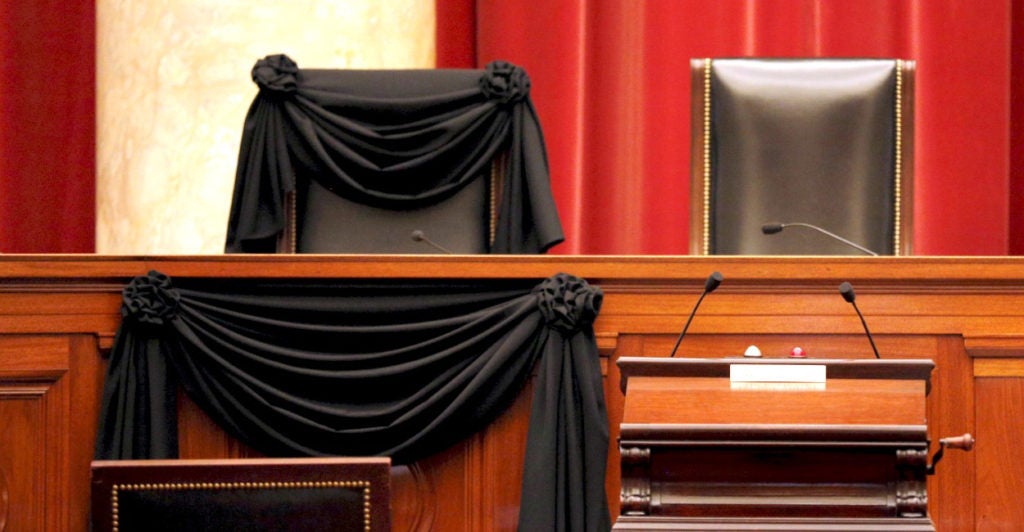Last week, the Supreme Court concluded its 2015-16 term, and it’s safe to say there were several disappointments for conservatives.
The sudden death of Justice Antonin Scalia in February led to deadlocks and compromises in some of the biggest cases of the term, much to the chagrin of conservatives. Consider five of the biggest cases:
1. Fisher v. University of Texas at Austin: This was Abigail Fisher’s second trip to the Supreme Court in her challenge to the school’s racially discriminatory admissions program. The Supreme Court ruled 7-1 in her favor last time, finding that the lower courts were too deferential to school officials. But this time around, four justices found that deference “must be given” when school officials give a “reasoned, principled explanation” for why they must discriminate against some applicants in favor of certain preferred minority applicants.
This was over the protest of three dissenting justices since Justice Elena Kagan was recused. Had Scalia been on the Supreme Court, it’s possible he might have been able to persuade the majority to rule for Fisher once again.
2. Friedrichs v. California Teachers Association: Public school teachers who opted out of union membership challenged the requirement that they subsidize the costs of collective bargaining, arguing that they were being forced to pay for the union’s lobbying the state over teacher salaries and benefits in violation of their First Amendment free speech and associational rights.
This case was an opportunity to reverse a bad precedent dating back to the 1970s that allowed the government to force employees to pay a “fair share” for collective bargaining, even if they opted out of union membership. But without Scalia, the Supreme Court tied 4-4 and affirmed the lower court’s ruling in favor of the union.
3. Whole Woman’s Health v. Hellerstedt: Abortion clinics and doctors challenged Texas’ commonsense law updating the health and safety standards for clinics and requiring doctors who perform abortions to have admitting privileges at a nearby hospital. The Supreme Court concluded that neither provision advanced the health of women and instead placed an “undue burden” on them.
Though the Supreme Court previously determined that such regulations are subject to the lowest standard of review, the five-member majority held Texas’ regulations to a much higher standard. Justice Anthony Kennedy wrote that older opinion Gonzales v. Carhart (2007), and perhaps Scalia, could have reminded Kennedy of this and convinced him to vote in favor of the state.
4. Zubik v. Burwell: The Little Sisters of the Poor and other religiously-affiliated organizations challenged Obamacare’s requirement that nonprofit employers provide employee health insurance that covers potentially life-ending drugs and devices. Unlike the full-throated defense of religious freedom the Supreme Court delivered in Burwell v. Hobby Lobby (2014), it issued a short, unsigned opinion instructing the lower courts to reconsider these claims in light of the government’s belated admission that it could provide the mandated coverage without forcing the employers to violate their religious beliefs. The court noted that it was not considering the merits of these claims; thus, Scalia could have made the difference.
5. United States v. Texas: Twenty-six states challenged the Obama administration’s attempt to unilaterally change the law and give legal status and work authorizations to almost 5 million illegal aliens. The Supreme Court split 4-4, leaving in place the preliminary injunction issued by a district court judge in favor of the states as the case continues.
At its core, this case was about the separation of powers, underscoring why each branch of government must respect the limits of its authority. Scalia, an ardent defender of the separation of powers, was not shy about chastising members of any branch of government when they stepped out of line. Imagine the sarcasm-dripping opinion Scalia might have written condemning the administration’s attempt to change the law.
This term can be summed up as a series of missed opportunities for conservatives: eliminating (or at least limiting) public schools’ use of racial preferences in admissions decisions; safeguarding the free speech and associational rights of public employees; allowing states to pass commonsense laws regulating abortion providers like other medical professionals; definitively protecting the religious freedom of the Little Sisters of the Poor and other faith-based organizations; and emphatically rebuking a lawless administration that attempts to change the law when Congress won’t submit to its will.
Moreover, this term will be remembered as the one when conservatives lost a standard-bearer and liberals lost a worthy opponent. As we analyze the Supreme Court’s just-concluded term, it is the void that Scalia left behind that conservatives will remember most.
To hear about these cases and more, join us at The Heritage Foundation for our annual Supreme Court Review Wednesday at 11:00 a.m. (RSVP or watch it live here). This two-panel event will feature Supreme Court litigators Scott Keller, David Frederick, and Kannon Shanmugam as well as Jess Bravin, Adam Liptak, and Amy Howe.
